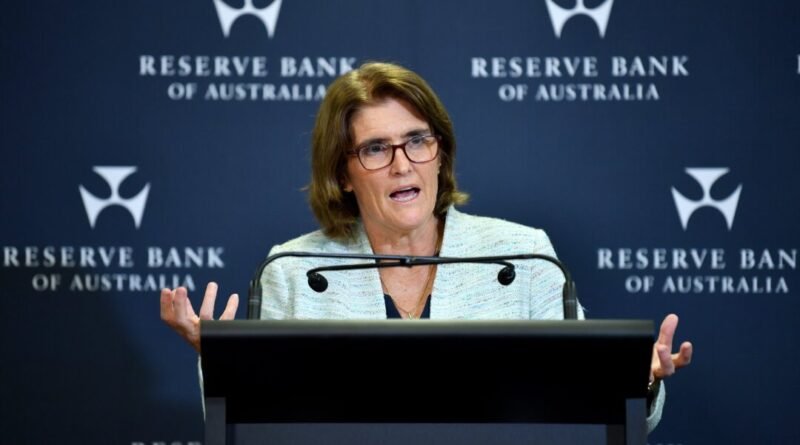RBA Governor Gives Reasons for Australia’s Delayed Interest Rate Cuts
Bullock stated that Australia sets its interest rates based on domestic circumstances, noting that we have been less restrictive compared to some others.
Reserve Bank of Australia (RBA) Governor Michele Bullock has broken her silence on why Australia is lagging behind other countries in cutting interest rates.
Bullock explained that Australia tailors its interest rates to domestic circumstances, noting, “We have a floating exchange rate, so we are able to do that.”
She highlighted that economic conditions in Australia differ from those in the United States, New Zealand, Canada, and other nations.
“New Zealand and Canada have seen quite sharp rises in unemployment. The United States is a little different as well,” Bullock said, also pointing out that inflation hit these countries before Australia.
Most of these nations had official interest rates around 5 percent or higher, Bullock noted.
“So, in our judgment, we look at how restrictive some of those countries are compared to us. They are now easing some of their restrictions because they’re seeing disinflation.”
Bullock also commented on how those restrictions have impacted labor markets abroad.
However, when asked about politicians’ reactions to the RBA’s decision, she urged to be left out of political debates.
“My only comment is that we are doing what we think is best to maintain this narrow path of bringing inflation down. It’s still too high and not back in the target band. According to our current forecast, inflation won’t sustainably return to the band until 2026.”
On Sept. 18, the U.S. Federal Reserve announced a half-percentage-point cut in interest rates.
Other central banks, including those in Canada, the UK, EU, and New Zealand, have also reduced rates since last year.
Bullock acknowledged that while Australia had not raised interest rates as high, it had not seen the same labor market deterioration as these countries.
“We’re monitoring closely for similar inflation trends here,” she said.
Political Reactions: Chalmers vs Taylor
Treasurer Jim Chalmers expressed cautious optimism following the RBA’s decision to hold the cash rate at 4.35 percent after its review on Sept. 24.
According to Chalmers, the government’s focus on combating inflation has yielded positive results.
“Interest rates haven’t gone up for nearly a year, and this reflects the progress we’ve made in getting inflation down. When we took office, inflation was 6.1 percent. It’s now half of its peak.”
However, Chalmers acknowledged that weak economic growth, sluggish consumption, and declining discretionary spending continue to weigh on the economy.
He emphasized that the RBA and the government share the goal of controlling inflation, though both remain mindful of risks to economic growth.
“While inflation has fallen, it’s still higher than we’d like. We’re making progress, and the upcoming monthly inflation data will provide further insights.”
In contrast, Shadow Treasurer Angus Taylor took a more critical stance, arguing that the RBA’s decision to hold rates reflects the ongoing economic pain for Australian households.
Taylor pointed out that while countries like the United States, Canada, and the UK have seen interest rates fall, Australia remains “at the back of the pack.”
“The RBA highlighted today that we can’t expect to return to the inflation target until mid-2026, a much longer road than anticipated,” Taylor said.
He accused the government of focusing on manipulating headline inflation, rather than addressing core inflation, which remains stubbornly high.
Taylor argued that the government is relying on short-term measures to temporarily reduce inflation without tackling the underlying causes.
In turn, Chalmers defended the government’s cost-of-living relief measures, such as energy bill relief and cheaper childcare, stating that they were designed to ease price pressures without adding to inflation.
He also commended the government’s management of budget surpluses, which the RBA acknowledged as contributing to controlling inflation.
Productivity and Immigration Concerns
Shadow Treasurer Taylor also raised concerns about labor productivity, accusing the government’s industrial relations policies of contributing to a decline.
He cited the RBA’s finding that productivity is at 2016 levels, warning that this decline could lead to reduced public spending on infrastructure like roads, schools, and hospitals.
He further criticized the government for failing to improve the supply side of the economy, leading to persistent inflation. According to Taylor, “The supply side of our economy is broken.”
Another major issue raised by Taylor was the role of immigration.
He said high levels of immigration were adding to inflationary pressures and argued that the government had “lost control” of the policy. He cited RBA data highlighting the strong growth in population and spending by international students.
Chalmers countered these claims, stating that the government was managing net overseas migration carefully.
He pointed out that the RBA had found international student spending had supported aggregate demand, although overall consumption remains weak due to inflation, global uncertainty, and higher interest rates.





